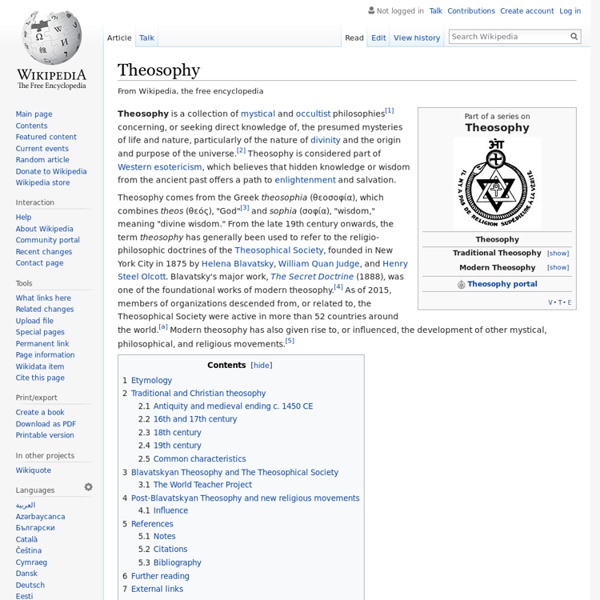Spiritism
Allan Kardec, The Codifier of Spiritism Spiritism is a doctrine codified in the 19th century by the French educator Allan Kardec. Spiritism soon spread to other countries, having today 35 countries represented in the International Spiritist Council.[1]
Higher consciousness
Higher consciousness is the consciousness of a higher Self, transcendental reality, or God. It is "the part of the human being that is capable of transcending animal instincts". The concept developed in German Idealism, and is a central notion in contemporary popular spirituality.
H.P. Blavatsky Articles and quotes
HPB, as Helena Petrovna Blavatsky is often called, is a giant in the history of Western Occultism and the history of 19th century eastern religion. She, through her writings and her contributions to the Theosophical Society, brought eastern concepts like karma and reincarnation to the West. She was also instrumental in helping people in Asia appreciate their own religions more. Olcott did a lot of the heavy lifting, but Madame Blavatsky's contribution can't be ignored. Books like Isis Unveiled weren't read by Westerners alone.
Sisyphus or “Sissy Puss”? – Deep Brain Diary
An Apt Metaphor? YOU Be the Judge! I just walked to and from the Clinical Center for lunch.
Jnana
Jnana or gnana or gnaan (Sanskrit; Pali: jñāna) is a Sanskrit word that means knowledge. It has various nuances of meaning depending on the context, and is used in a number of different Indian religions. The idea of jnana centers around a cognitive event which is recognized when experienced.[1] It is knowledge inseparable from the total experience of reality, especially a total reality,[1] or supreme being within Mahesha-dhama (and/or material world) such as Siva-Sakti.[2] Absence of jnana (knowledge, gnosticism) is known as ajnana (see: agnosticism): Famous mantra in this relationship says: "Om ajnana timirandhasya..." (I was born in ajnana, agnosticism, but my spiritual master opened my eyes with fire of transcendental knowledge, jnana).
Anima mundi
World soul Therefore, we may consequently state that: this world is indeed a living being endowed with a soul and intelligence ... a single visible living entity containing all other living entities, which by their nature are all related.[1] Other resemblances can be found in the thoughts of hermetic philosophers like Paracelsus, and by Baruch Spinoza, Gottfried Leibniz, Friedrich Schelling and in Hegel's Geist ("Spirit"/"Mind"). Ralph Waldo Emerson published "The Over-Soul" in 1841, which was influenced by the Hindu conception of a universal soul. There are also similarities with ideas developed since the 1960s by Gaia theorists such as James Lovelock.[citation needed]
The Ocean of Theosophy by William Q. Judge (TUP Edition)
Theosophical University Press Online Edition By William Q. Judge Originally published 1893.
Marquis de Condorcet
Marie Jean Antoine Nicolas de Caritat, Marquis of Condorcet (French: [maʁi ʒɑ̃n‿ɑ̃twan nikola də kaʁita kɔ̃dɔʁsɛ]; 17 September 1743 – 29 March 1794), known as Nicolas de Condorcet, was a French philosopher and mathematician. His ideas, including support for a liberal economy, free and equal public instruction, constitutional government, and equal rights for women and people of all races, have been said to embody the ideals of the Age of Enlightenment and Enlightenment rationalism. He died in prison after a period of flight from French Revolutionary authorities.



